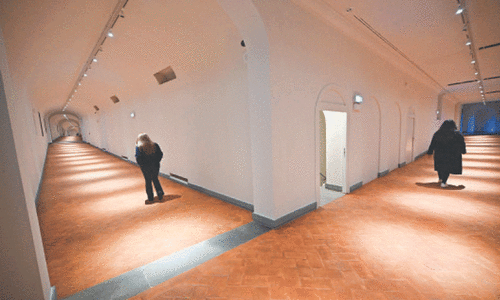BEIRUT: A Beirut car bomb that killed an anti-Syria politician underscores how Lebanon has become a “microcosm of regional conflicts”, with violence escalating as Damascus and its ally Tehran become more emboldened, analysts say.
Friday’s bombing that killed seven people, including Mohammad Chatah, a voice of moderation and a Sunni member of Lebanon’s anti-Syria March 14 coalition, will also further fuel Saudi-Iranian animosity, the experts say.
“This latest political assassination reflects much more than a simple spillover of the Syrian war. I think we’re past that stage, and we have now entered a fully-fledged Saudi-Iranian proxy war,” said Paris-based expert Karim Bitar.
“The intense polarisation in Lebanon makes it easy for Iran and Saudi Arabia” to settle scores here, “and the country has zero immunity,” said Bitar of the French Institute for International and Strategic Studies (IRIS).
Lebanon is sharply divided over the war in neighbouring Syria.
Tehran-backed Hezbollah backs President Bashar al-Assad’s regime, while the March 14 coalition supports the revolt that broke out in 2011.
Damascus ended its 30-year domination of Lebanon in 2005, but continues to exert significant influence over the country through its ally Hezbollah.
The Shia group has thrown its weight behind Assad’s regime in Syria’s war, sending political and sectarian tensions in Lebanon soaring.
Lina Khatib, who heads the Carnegie Middle East Centre, described Lebanon as “a microcosm of regional conflicts, and it would be fanciful to assume that it would manage to escape the security repercussions of the Syrian conflict.”
And with the West all but silent on Syria, Assad and his allies in Iran and Lebanon are feeling “more empowered following the international negotiations about nuclear and chemical weapons,” said Khatib.
Chatah’s killing comes in the context of “a series of attacks and counter-attacks targeting opposing political camps in the country,” she added.
Last month, twin suicide blasts hit the Iranian embassy in Hezbollah’s southern Beirut stronghold, killing at least 25 people.
That attack came after two car bombs in south Beirut in summer. One of them, on August 15, killed 27 people.
“The attacks (against both sides of Lebanon’s political divide) are aimed at destabilising Lebanon and pulling it closer to the Syrian conflict,” said Khatib.
Heading for escalation
IRIS’ Bitar said attacks against both March 14 and Hezbollah targets are both “pure, unadulterated terrorism,” but emphasised that “the modus operandi and rationale are very different.”
Starting in 2005, nine anti-Assad politicians and intellectuals have been assassinated in attacks widely blamed on Syria. Two other security officials and a general were also killed.
This string of killings started years before the Syrian revolt, and with the latest assassination, “Syria might be sending the message that it is still able to destabilise Lebanon if its influence and interests are not preserved,” said Bitar.
As for the attacks against Hezbollah targets, “they are part of a wider regional power struggle between rival intelligence services (and) the consequence of rising Sunni-Shia animosity.”
Regional powerhouse Saudi Arabia backs Hariri’s camp in Lebanon and has supported, along with Qatar, Syrian rebels against Assad’s regime.
With Saudi-Iranian rivalry at an all-time high, it is likely the attacks Lebanon is suffering will only escalate.
“Only an Iranian-Saudi rapprochement can put an end to such crimes, and it seems far off,” said Bitar.
Meanwhile, the elimination of moderates like Chatah benefits extremists on both sides of the Shia-Sunni divide.
“Lebanese moderates no longer have a word to say and two mutually reinforcing Sunni and Shia extremisms are now left alone,” said Bitar.
Imad Salamey, who teaches politics at the Lebanese American University, agreed, warning that Iran will be the main beneficiary of heightened Sunni extremism.
“If this continues, what we will be left with is... Sunni extremists leading the Sunni communities,” Salamey warned.
“These extremists are presented as hostile to the West, as hostile to moderate solutions... and therefore this will give the upper hand to... the Iranian proxy groups... and will make them look like the moderates.”
The attack comes in the midst of a Lebanese domestic political crisis. For eight months, Lebanon has had no government, and March 14 and Hezbollah appear further than ever from reaching a deal.
Salamey said: “I think it is very possible that a new series of assassinations and car bombs will begin taking place... as both parties... are stuck, and are unable to come up with an acceptable solution to either side.”
Friday’s bombing is also seen in some quarters as a warning shot ahead of the start on Jan 16 of the UN-backed Special Tribunal for Lebanon, tasked with investigating the 2005 assassination of Lebanese former prime minister Rafiq Hariri.
Five Hezbollah members have been accused of involvement in Hariri’s killing and are due to be tried in absentia by the court.—AFP













































